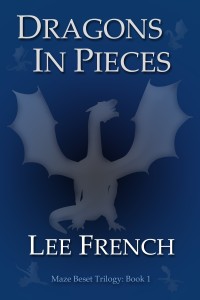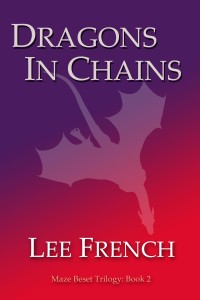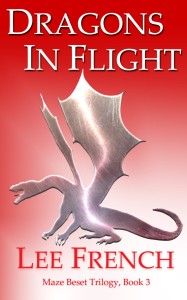Interview – Author of the Maze Beset Trilogy, Lee French
Self-Publisher’s Showcase: Today we are joined by Lee French, author of Maze Beset trilogy. Welcome to the Showcase, Lee. For any of our readers that haven’t come across your work previously, can you take a moment to tell us all a little about yourself?
Lee French: I’m an escapee from software tech support, have a degree in mass media communication (cinematography emphasis), and am a single mom of two kids. I’ve been writing since I was a child, though I wouldn’t say it was any good until relatively recently. The first time I “published” a book was in 2nd grade, when I entered a district book fair with a title bound by fabric covered cardboard. It was a six page tome entitled ‘The Mean Old Man Next Door’. My drawing skills have always been fairly poor, so it featured stick figures. Once a self-publisher, always a self-publisher.
SPS: What are your perfect writing conditions, and how often do you write?
LF: I get my best work done alone in a comfy seat. I have no other particular requirements, though music usually helps, especially if there’s other ambient noise. I listen to David Garrett most of the time, but also sometimes Apocalyptica, and sometimes a mixed collection of my favorite songs from various rock bands of the 80s and 90s.
SPS: Can you put your finger on the moment where you decided that you wanted to publish your work?
LF: It happened in the summer of 2012. I got divorced, which made me think pretty hard about getting a job after being a stay-at-home-mom for twelve years. It wasn’t a good time to be looking for a job, and I panicked a little. I resolved that I would give writing a shot in a professional sort of way and gave myself a deadline, by which I would either have something published somehow, or I would figure out a real job. Dragons In Pieces was the book I wrote to meet that challenge, for NaNoWriMo. It was my fourth time doing NaNo, and my fourth win, and I learned a whole lot during those next several months up until the book was actually published.
SPS: Why do you think it is that you have decided to work in Science-Fiction and Fantasy, and do you see yourself ever writing in other genres?
LF: I grew up in Silicon Valley as a gamer and a nerd, and voracious devourer of fantasy and sci-fi novels. That led me to playing Dungeons & Dragons, and there was no turning back. I might wind up doing some paranormal romance at some point, but I can’t see myself ever being interested enough in any other genre to maintain enthusiasm all the way through a first draft. I like magic and cyberarms and nonbots and elves and dragons. The Maze Beset trilogy is about as close to ‘real life’ as I can get without snickering to myself over the words. I do love to read thrillers, but I don’t have the meticulous nature needed to write them.
SPS: Dragons in Pieces is the first book in the Maze Beset trilogy, can you tell us about the novel?
LF: At its core, the story is about personal responsibility, family, and adapting to change. It follows Bobby from the point of being yanked out of his boring, comfortable life and thrust into something he doesn’t understand but has to deal with anyway. Along the way, he makes friends and meets a girl, and chases – or follows, depending upon how you look at it – sinister men in suits whose motivations are unclear.
SPS: What’s the story behind your protagonist Bobby, how has his past shaped the person we meet?
LF: Bobby is a regular guy, an everyman, who has something unbelievable happen to him. One day, his life gets turned upside down because he’s suddenly a superhero, and he’s faced with a lot of challenges because of it. The poor guy starts as an appliance delivery guy and winds up getting arrested, shot, tased, abducted, poked and prodded with needles, and more. He’s a lovable idiot and a charming hick.
SPS: How does he react to discovering he’s a superhero?
LF: Since he’s in a rather unpleasant position when it happens, he freaks out a little. Just a little. Bobby is a solid guy, and once he accepts that things have gone beyond the pale, he just gets on with getting on with things. On the whole, the characters aren’t especially upset about their abilities, but some of them have more trouble adjusting to and controlling their powers than others.
SPS: What sort of situations do these superheroes come up against, any ‘baddies’ to look out for?
LF: The villains in the first book are all normal people, but they’ve got a drug that can neutralize superpowers. The men in the dark suits always manage to somehow be a step ahead or just a step behind Bobby and the other supers.
SPS: How did you find concluding your first novel, did you try to tie things up or did you prefer questions left answered?
LF: Since I knew it would be a trilogy from the outset, and knew the arc the trilogy would take, I concluded it while setting up the second book. Lots of questions are unanswered, but it still feels like a conclusion.
SPS: Is there a particular reader you feel the books would appeal to?
LF: I expect people who like comic books, the Heroes TV show, Dr. Who, and comic book movies would like this. My instinct says it would appeal more to men than women, but the women who’ve read it and said something to me have all liked it.
SPS: What could a reader expect from Dragons in Chains; the second instalment in the series?
LF: This book is the middle bits of the arc. It takes Bobby to some really dark places, and he has to forgive himself for some of the things he does. That process continues in the third book. It’s worth noting that this one ends with a cliff-hanger. It’s a conclusion from a particular point of view, but not from Bobby’s perspective. I took my cue from the original Star Wars series for how this one ended. Spoiler: Han ends up in frozen in carbonite.
SPS: Did you finding the writing process any easier second time around?
LF: Technically, Dragons In Chains was the sixth book I’ve written. It was just the second one I was willing to share with other people. I wrote the first draft before Dragons In Pieces was published, and it was a very quick write. The first draft didn’t need a lot of reworking, either, because I knew what I wanted to do and it came out really well.
SPS: Did you found the pacing of the book different to Dragons in Pieces; was there less of a need for introductions and explanations?
LF: The pacing isn’t really that different. Bobby starts in jail, and winds up traveling a lot. More characters were introduced, and others came back for additional appearances. There’s a big fight scene in both, and some chasing and snooping. The biggest difference is the time I spend on asides, following the viewpoints of the ‘enemy’ superheroes.
SPS: Is there the introduction of any new characters that readers should be on the lookout for?
LF: The trilogy has 35 superpowered people in total. Most of them appear in this book, at least briefly.
SPS: We don’t want to encourage spoilers, but does everything tie together nicely in the concluding part of the trilogy – Dragons in Flight – and do you have plans to ever revisit the characters again?
LF: Everything gets tied up, but I’ve left things with the possibility of having a slip ‘twixt cup and lip, as the saying goes. There’s an obvious direction to go (it’s obvious to me, anyway), so I’ll probably come back to these people at some point. Which character I wind up using to tell it is up in the air.
SPS: You also have a short story collection that sits between the first two books in the trilogy – At the Farm – was it always the plan to write this compilation and are you tempted to expand on any of the stories?
LF: I wrote the stories directly after completing the first draft of Dragons In Pieces, on a whim. So many of the characters are only briefly touched on, and I wanted to explore them more. It wasn’t until much later, after I was preparing to release Dragons In Chains that I thought other people might want to read them, other than the last one, which explains what happened to Jasmine (sort of). I don’t see them as anything more than slices of life, and have no plans to add more or build any of them into larger tales.
SPS: We do like to take a look at covers and the stories behind them. Can you tell us about how your covers for the Maze Beset series came about?
LF: I really had no idea what I was doing when I made the cover for Dragons In Pieces, I just knew I couldn’t afford to pay someone to make it for me. A few friends tried to help me realize my vision for it, but in the end, I had to scale back my ideas and I found a stock image of simple dragons that appealed to me. The original cover looked great in print, full of whimsy and silliness with a bunch of different little dragons all over, attacking the words and flying across it, but I soon realized it wasn’t very professional. A friend who works in design gave me some pointers and helped critique my ideas, which resulted in the covers I have now.
I picked the dragons I did for each cover because they represent what happens in the book. In the first one, Bobby is dragon and we hear him roar. In the second, he descends into dark places, and in the third, he’s all over the place which makes the juxtaposition of ‘flight’ with an obviously sitting dragon apropos.
SPS: What can we expect next from the pen/keyboard of Lee French?
LF: I’m currently working on the first draft of the second book for The Greatest Sin, a series I co-write with Erik Kort. The first book is called The Fallen, and tells the story of Chavali, a gypsy-eqsue fortune teller with the gift/curse of prophecy. She’s a difficult (as in pain in the ass) woman who lies for a living and doesn’t have a very high opinion of anyone else. Which makes doing awful things to her a great deal of fun.
SPS: Was the Self-Published/Indie-Published route always your preferred route for your work?
LF: When I decided I wanted to be published, I really had no idea what to do. I looked around and talked to some people, and found myself staring at a blank page, trying to figure out how to write a query letter. When I still had a blank page two weeks later, I decided it wasn’t going to happen that way. Besides being intimidated by the query letter, though, I’ve seen plenty of crap coming out of the publishing houses, and don’t have a lot of respect for the people who choose the ‘winners’.
SPS: Has the experience so far been all that you thought it would be?
LF: I do like the control I have over everything, but there are times when I kind of wish I could get someone to do all the stuff for me, so I can spend my time writing instead of scouring the internet for images for my next cover, or writing up business expense lists, or a number of other details that come with being self-employed.
SPS: If you could give one piece of advice for someone looking to get into writing, what would it be?
LF: Write words. Lots of words. Can’t be a writer if you don’t write.
SPS: Before we bring this interview to a close, it’s your chance to name-drop. Anyone who you feel is deserving of more recognition at present or someone whose writing you have recently enjoyed? Now is your chance to spread the word…
LF: I’m really impressed with Scott Spotson, and my co-author for The Greatest Sin, Erik Kort, is just about to release his own first book under the name Erik Marshall. I’ve read it, and I liked it, so there’s that.
SPS: Thank you for joining us today Lee, and all the best for the future.
LF: My pleasure. I love doing this stuff so much I recently wrote a guest post for The Fallen’s blog tour about toilets.
SPS: For more information on Lee French and her work, please do visit her Author page here.
















Leave a Reply